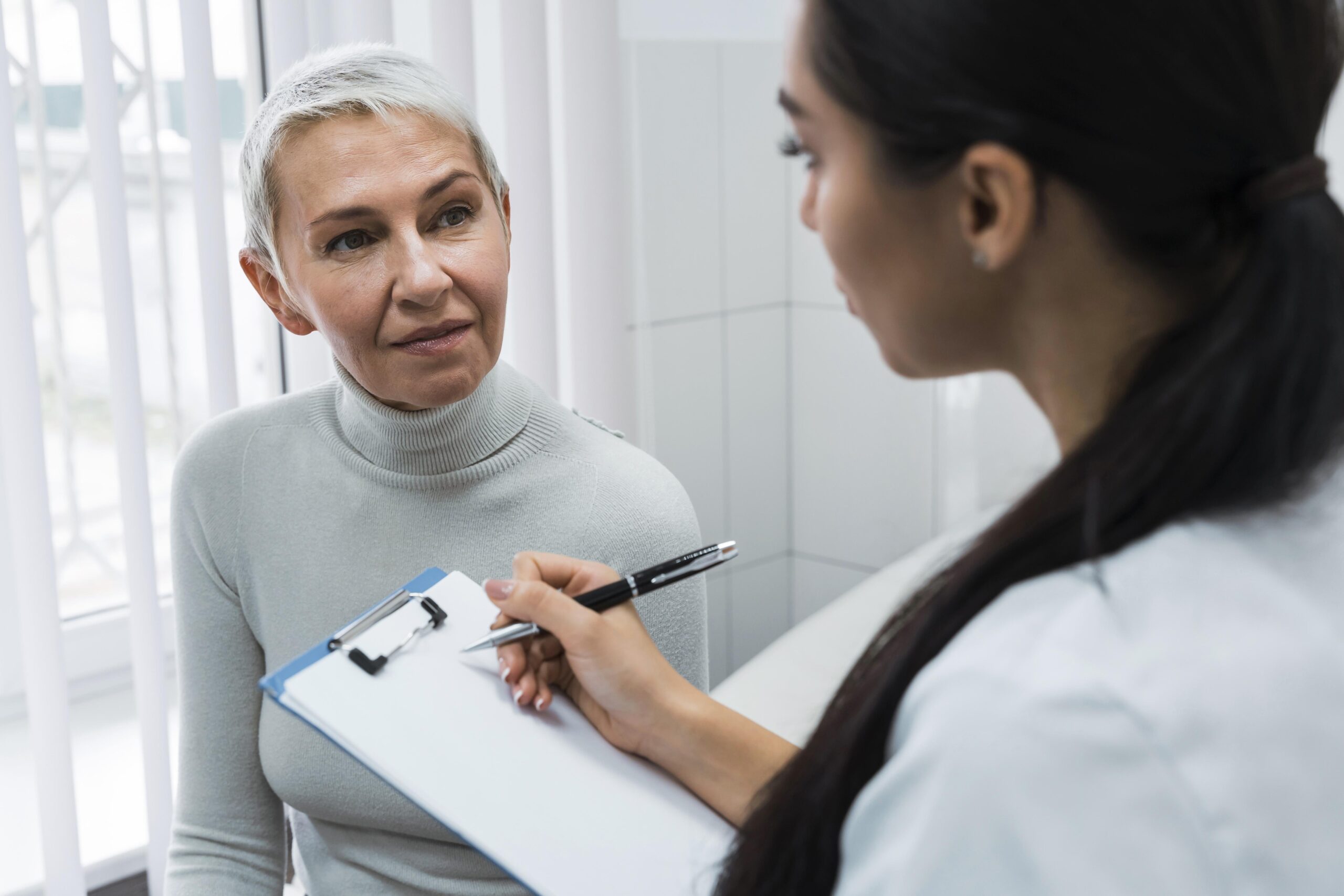Menopause is a natural, meaningful moment in a woman's life. It is definite evidence of the changes taking place in the organism. Menopause indicates the end of the functions of the reproductive system and, consequently, the possibility of having children.
It is the last menstrual period, after which no vaginal bleeding occurs for 12 months, excluding diseases and disorders that may lead to the cessation of menstruation.
The appearance of symptoms associated with it results from the body's aging process and the gradual extinction of ovarian functions – exhaustion of their reproductive capabilities. During its duration, the secretion of hormones (estrogens and progesterone) decreases, leading to the loss of ovulatory cycles and then the cessation of menstruation.
Typically, menopause![]() occurs between the ages of 45 and 55
occurs between the ages of 45 and 55![]() .
.
The moment of menopause depends on many factors, like:
There is growing emphasis on the influence of environmental factors related to lifestyle and the exposome's impact on the body's hormonal balance. The initial symptoms of menopause may appear much earlier, with the transition period or perimenopause beginning up to 10 years before menstruation completely ceases (on average 5-6 years). Premature menopause![]() can occur in some women as young as 35-40.
can occur in some women as young as 35-40.

During perimenopause, changes are observed in the nature, duration, and interval between periods. Expected bleeding becomes less predictable – cycles may be longer or shorter, bleeding becomes longer and more abundant, and sometimes menstruation does not appear. Bleeding or spotting between periods is more common.
The so-called withdrawal symptoms may appear already in the premenopausal period and become visible on average 2 to 5 years after menopause. Belong to them:
Estrogen deficiency may lead to changes in vulva – atrophy with painful intercourse, vaginal dryness, more frequent infections of the intimate areas, and urinary incontinence.
Long-term hormonal deficiencies are a risk factor for developing osteoporosis, cardiovascular diseases, obesity, Alzheimer's disease, and atherosclerosis in the future.
Menopause is diagnosed![]() based on a conversation with the patient when they declare that the last menstrual period occurred more than 12 months earlier and that it was not the result of illness, pregnancy, or other medical condition.
based on a conversation with the patient when they declare that the last menstrual period occurred more than 12 months earlier and that it was not the result of illness, pregnancy, or other medical condition.
If menopause occurs before age 45, the doctor may order additional tests to confirm the diagnosis. Menstrual disorders may require diagnostic curettage of the uterine cavity.

Currently, many methods help alleviate the symptoms of perimenopause. Hormone replacement therapy![]() (HRT) is used in perimenopausal and postmenopausal women. Administration of hormones helps reduce the troublesome symptoms of menopause. This therapy is also effective in women who pathologically stopped menstruating quickly (premature menopause) and in patients after ovarian removal surgery. It involves the use of estrogens balanced by the action of gestagens.
(HRT) is used in perimenopausal and postmenopausal women. Administration of hormones helps reduce the troublesome symptoms of menopause. This therapy is also effective in women who pathologically stopped menstruating quickly (premature menopause) and in patients after ovarian removal surgery. It involves the use of estrogens balanced by the action of gestagens.
Taking estrogen alone may be dangerous due to its impact on the epithelial tissue lining the interior of the uterine cavity and raising the risk of developing endometrial cancer. For this reason, you should always use a gestagenic component with estrogens to protect against this unfavorable effect on patients. The only exceptions to this rule are women who have had their uterus (including the cervix) removed.
The routes of HRT administration are varied. The most commonly used form is oral therapy. However, you can take medications parenterally, i.e., through muscle injections, patches, creams, and others.
Hormone replacement therapy severely interferes with a woman's hormonal system. That is why detailed research should be carried out before its implementation to ensure relative safety during the therapy. For this purpose, the doctor should evaluate the endometrium and reproductive organs in ultrasound and during a clinical examination. Additionally, it is significant to perform cytological evaluation of the cervix and mammography. Commonly accepted absolute contraindications![]() to HRT are:
to HRT are:
It is significant whether the uterus is preserved or, for example, the woman had to undergo surgical removal of the uterus (hysterectomy) for various reasons. This information plays a decisive role in choosing therapy. If the patient does not have a uterus – estrogen monotherapy is recommended in most cases.
The specialists recommend taking the lowest dose of hormones in the shortest time. The least adequate amount of the drug is the one that alleviates or eliminates menopausal symptoms in a woman.
If bleeding occurs after menopause, you should immediately see a doctor for diagnosis. Any spotting or bleeding from the genital tract occurring six or more months after the last menstrual period is considered abnormal. Menstrual disorders in abundant, frequent, prolonged menstruation in the premenopausal period also require extended diagnostics.
During the menopausal diet![]() , phytoestrogens turn out to be particularly crucial. These are substances contained in plants that act as estrogens in the body. They not only alleviate typical symptoms associated with menopause but also protect against the development of osteoporosis and atherosclerosis, to which women during menopause are particularly vulnerable. For every woman wondering what to eat during menopause, products containing phytoestrogens will be the most recommended.
, phytoestrogens turn out to be particularly crucial. These are substances contained in plants that act as estrogens in the body. They not only alleviate typical symptoms associated with menopause but also protect against the development of osteoporosis and atherosclerosis, to which women during menopause are particularly vulnerable. For every woman wondering what to eat during menopause, products containing phytoestrogens will be the most recommended.
Whole grain products also play an essential role in the diet during menopause. They are rich in nutrients such as fiber and B vitamins. Whole grain products reduce the risk of diseases women are exposed to during menopause, such as various heart diseases and cancers. In addition, the fiber they contain effectively accelerates metabolism.
Limit your consumption of processed, fried foods and products with a high glycemic index. Due to a slower metabolism and poorer circulation, your body retains more water, which often causes it to become swollen. Drink plenty of water (at least 2 liters a day), and limit your caffeine and salt intake to control swelling.
Supplementation during menopause will supplement the deficiencies of important vitamins and minerals. First of all, supplement – preferably after consulting a doctor – the following ingredients:

A properly balanced diet will also help you maintain an appropriate weight![]() during menopause – and this is not so easy. During menopause, the distribution of fat in the tissues changes – it mainly accumulates in the abdominal area, surrounding the body's internal organs.
during menopause – and this is not so easy. During menopause, the distribution of fat in the tissues changes – it mainly accumulates in the abdominal area, surrounding the body's internal organs.
The first factor that undoubtedly influences women's weight gain during menopause is changes in sex hormone concentrations. Sex hormones play a vital role in the proper functioning of our body. They influence, among other things, lipolysis, and lipogenesis, or, to put it simply, the processes related to the synthesis and breakdown of fat. They also regulate the production of biologically active substances secreted by adipose tissue, i.e., adipokines, such as:
As we age, it is natural to lose muscle mass. If we do not include physical activity in our weekly schedule, lean body mass will be replaced with fat. It should also be remembered that the smaller the number of muscles in the body, the slower the metabolic rate – physical activity after the age of fifty “speeds up” the metabolism. Regular physical activity also protects against bone loss, which can lead to osteoporosis.
During menopause, the skin![]() requires special care:
requires special care:
Remember that the skin is the first organ showing hormonal changes throughout the body. At the same time, appropriate care can quickly improve its quality and protective functions. It is also worth checking your skin regularly with a dermatologist because melanoma is most often detected in this age group – the most dangerous skin cancer (and at the same time, the easiest to cure, provided it is diagnosed early enough).
Not only the skin but also the hair![]() suffers from menopause. Estrogens have a beneficial effect on hair follicles, extending the anagen phase and accelerating hair growth. If their production decreases, the influence of androgens begins to dominate – and these hormones unfortunately lead to atrophy of the hair follicles located on the head and hair loss.
suffers from menopause. Estrogens have a beneficial effect on hair follicles, extending the anagen phase and accelerating hair growth. If their production decreases, the influence of androgens begins to dominate – and these hormones unfortunately lead to atrophy of the hair follicles located on the head and hair loss.
In women, hair thins out evenly over the entire head, in the parietal or crown area. Appropriate hair care and professional treatments to stop baldness will help.
On the other hand, androgens stimulate hair growth in the so-called androgen-dependent areas, i.e., on the chin, above the upper lip, on the lower abdomen, under the arms, and in the genital area.
How to get rid of it? Classic hair removal methods, e.g., cream, wax, and shaving with a razor, will be helpful. You can also perform a laser treatment that permanently reduces hair – although it will not always be effective due to the too-low content of melanin in the hair, which is a chromophore that absorbs laser energy.
Menopause is a difficult moment in a woman's life, including her intimate life. As a result of hormonal changes, symptoms appear related to vaginal dryness and atrophy of the tissues that protect the sexual organs.
Just like on the face and the entire body, tissues gradually atrophy, and the natural hyaluronic acid content responsible for skin hydration and elasticity decreases. Decreased estrogen production slows down the activity of fibroblasts, causing atrophy of the dermis, and adipocytes (fat cells) in the genital area also reduce their volume, causing many ailments during everyday functioning: pain during intercourse, irritation, burning, discomfort, e.g., infections.
Many women of this age who report dyspareunia (pain during intercourse) suffer from tissue dehydration, dry mucous membranes, and cell degeneration. It mainly applies to women who do not use hormone replacement therapy. Vaginal dryness also contributes to urinary tract problems. With age, the pelvic floor muscles weaken, and the bladder and reproductive organs sag, which may cause symptoms of stress urinary incontinence (involuntary leakage of urine when coughing, laughing, exercising, etc.). Despite such severe symptoms, many women are reluctant to discuss their problems with a gynecologist. Meanwhile, many helpful methods exist, from topical hormonal drugs to aesthetic gynecology treatments, e.g., hyaluronic acid injections or laser therapy.